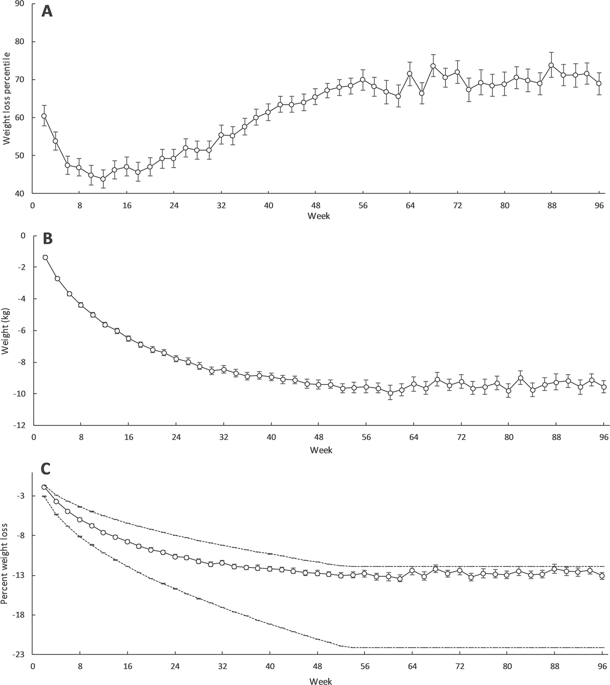当前位置:
X-MOL 学术
›
Eur. J. Clin. Nutr.
›
论文详情
Our official English website, www.x-mol.net, welcomes your
feedback! (Note: you will need to create a separate account there.)
Changes in body weight, adherence, and appetite during 2 years of calorie restriction: the CALERIE 2 randomized clinical trial.
European Journal of Clinical Nutrition ( IF 3.6 ) Pub Date : 2020-03-06 , DOI: 10.1038/s41430-020-0593-8 James L Dorling 1 , Sai Krupa Das 2 , Susan B Racette 3 , John W Apolzan 1 , Dachuan Zhang 1 , Carl F Pieper 4 , Corby K Martin 1 ,
European Journal of Clinical Nutrition ( IF 3.6 ) Pub Date : 2020-03-06 , DOI: 10.1038/s41430-020-0593-8 James L Dorling 1 , Sai Krupa Das 2 , Susan B Racette 3 , John W Apolzan 1 , Dachuan Zhang 1 , Carl F Pieper 4 , Corby K Martin 1 ,
Affiliation

|
BACKGROUND/OBJECTIVES
The Comprehensive Assessment of Long-term Effects of Reducing Intake of Energy Phase 2 (CALERIE) study showed that individuals who are nonobese were able to undergo significant calorie restriction (CR), yet the time course changes in adherence, weight, and appetite are unknown. This analysis aimed to investigate the time course changes in adherence, body weight, and appetite during the CALERIE study.
SUBJECTS/METHODS
Overall, 143 participants (body mass index: 21.9-28.0 kg/m2) were randomized to a CR group that aimed to achieve 25% CR for 2 years. Throughout the intervention, body weight was measured, and appetite was assessed through visual analogue scales. Algorithms were utilized with body weight measurements to calculate adherence percentile score. Participants targeted an adherence percentile score of 50, though being between 80 (lowest acceptable adherence) and 10 (highest acceptable adherence) was adequate. Polynomial regression analyses were used to assess time course changes.
RESULTS
Polynomials indicated that adherence percentile score increased above 50 after approximately week 20, although adherence remained acceptable (adherence percentile score less than 80) (R2 = 0.89; P < 0.001). Weight loss occurred until approximately week 60 and then plateaued (R2 ≥ 0.92; P < 0.001). Hunger and thirst increased (R2 ≥ 0.30; P < 0.001), but the total increase in scale scores were <10 mm throughout the intervention.
CONCLUSIONS
In individuals who are nonobese, adherence to 25% CR declines after 20 weeks, but 2 years of CR that stimulates a meaningful reduction in weight, promotes aging-related benefits and negligibly affects appetite is viable.
中文翻译:

2 年卡路里限制期间体重、依从性和食欲的变化:CALERIE 2 随机临床试验。
背景/目标 减少能量摄入的长期影响的综合评估第 2 阶段 (CALERIE) 研究表明,非肥胖个体能够进行显着的卡路里限制 (CR),但依从性、体重和食欲不详。该分析旨在调查 CALERIE 研究期间依从性、体重和食欲的时间过程变化。受试者/方法 总体而言,143 名参与者(体重指数:21.9-28.0 kg/m2)被随机分配到 CR 组,目标是在 2 年内实现 25% 的 CR。在整个干预过程中,测量体重,并通过视觉模拟量表评估食欲。算法与体重测量一起使用来计算依从性百分位数。参与者的目标是依从性百分位数为 50,尽管介于 80(可接受的最低依从性)和 10(可接受的最高依从性)之间就足够了。多项式回归分析用于评估时间过程的变化。结果多项式表明,大约第 20 周后,依从性百分位得分增加至 50 以上,尽管依从性仍然可以接受(依从性百分位得分低于 80)(R2 = 0.89;P < 0.001)。体重减轻一直持续到大约 60 周,然后趋于平稳(R2 ≥ 0.92;P < 0.001)。饥饿和口渴增加(R2 ≥ 0.30;P < 0.001),但在整个干预过程中,量表得分的总增加量<10 mm。结
更新日期:2020-04-24
中文翻译:

2 年卡路里限制期间体重、依从性和食欲的变化:CALERIE 2 随机临床试验。
背景/目标 减少能量摄入的长期影响的综合评估第 2 阶段 (CALERIE) 研究表明,非肥胖个体能够进行显着的卡路里限制 (CR),但依从性、体重和食欲不详。该分析旨在调查 CALERIE 研究期间依从性、体重和食欲的时间过程变化。受试者/方法 总体而言,143 名参与者(体重指数:21.9-28.0 kg/m2)被随机分配到 CR 组,目标是在 2 年内实现 25% 的 CR。在整个干预过程中,测量体重,并通过视觉模拟量表评估食欲。算法与体重测量一起使用来计算依从性百分位数。参与者的目标是依从性百分位数为 50,尽管介于 80(可接受的最低依从性)和 10(可接受的最高依从性)之间就足够了。多项式回归分析用于评估时间过程的变化。结果多项式表明,大约第 20 周后,依从性百分位得分增加至 50 以上,尽管依从性仍然可以接受(依从性百分位得分低于 80)(R2 = 0.89;P < 0.001)。体重减轻一直持续到大约 60 周,然后趋于平稳(R2 ≥ 0.92;P < 0.001)。饥饿和口渴增加(R2 ≥ 0.30;P < 0.001),但在整个干预过程中,量表得分的总增加量<10 mm。结











































 京公网安备 11010802027423号
京公网安备 11010802027423号